Interstellar Film Review
I don’t go out to the movies often. It isn’t because I don’t enjoy it, but taking the time to see a movie that starts at one time and can’t be stopped to pee or discuss plot twists isn’t something that has huge appeal to me. Also, for some inexplicable reason, movie theatres make me sick. I feel very ill about half the time, like I’m about to vomit. For this reason, I don’t buy drinks or popcorn. However, I did go see Interstellar in the theatre because my Model UN club was doing it.

170.180.30.244
I absolutely loved it. Interstellar is a feast for the senses; the visuals are stunning, the acting is superb, and the science is surprisingly legitimate. Go with your smart friend, the one who reads Scientific American and contributes in chemistry forums. I don’t normally recommend this, since my experience with this friend is that they keep whispering “that’s not how it works”. Not this film. Even if it does require some break from a realistic worldview to enjoy, the science in it is very plausible. This is the land of Hard Science. Hard Science is a version of sci-fi where things must be realistic, with few exceptions. Hard Science examples include Firefly and the Ender’s Game sequels. Mostly, the stuff that happens is real with some allowances, like faster than light travel, or the ansible. In Interstellar, it’s the wormhole.
I feel like it’s okay to mention the wormhole, because it’s in the previews for the film. It is a thing of beauty. The way light interacts with it, the way they include astrophysical theory, all of it comes together to make the wormhole itself a character. A character that is both good and evil, like Humbert Humbert in Nabokov’s Lolita.
The film is quite intense, so don’t let the slow beginning put you to sleep. All through the film a sense of urgency builds as the scenes take on more weight in less space, like a blackhole. As the plot progresses, the cuts get shorter and the scenes become more potent, building into a spectacular finish, a supernova of theatrical wonder.
This is a movie you’re going to want to talk about, but it’s hard to do that without spoilers. So bring your friends. If you don’t, you will regret it.
Now for my spoiler-laden breakdown.

Courtesy of: Paramount Pictures
I think this is 2001: A Space Odyssey. Or at least, the ending is. Watch 2001 if you’re up to it and then tell me that they don’t have the same ending. I think Interstellar does it best. 2001 is a confusing and ill-defined mind … uh … procreation, but Interstellar really does a good job.
My two biggest gripes with the film are firstly, that they didn’t think about time dilation before going down to the first planet. They mentioned that one hour down there would be at least seven years on the ship, and yet they didn’t consider that the information they were receiving was dilated? In one of the Orson Scott Card books, Valentine sends essays back to earth via ansible from the relativistic ship. She puts one out every hour, but on earth they are received every month. I’m assuming the astronauts would be aware of the phenomenon, if not the book itself. So why did they just go down when they had ten years of data? That would be about one hour planetside. They should have known that.
The second gripe is a stable time loop. When Cooper sends the messages to his past self, he’s only there because he received them. Where did the messages come from? Nowhere. The solution in the future created the problem in the past. That pissed me off. It’s totally recursive, so the plot can’t hold water, like a klein bottle.



